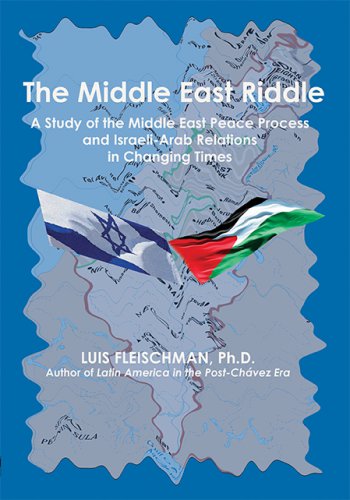
About the Author
Luis Fleischman is a political sociologist and a sociologist of international relations. He is a professor of Sociology at Palm Beach State College and the founding co-chair of the Palm Beach Center for Democracy, a recently created think-tank based in Florida. He is the author of the book Latin America in the Post Chavez Era: Threat to U.S Security (Potomac Books, 2013) and has written an extensive number of academic and journalistic articles on issues related to the Middle East, Democracy, Latin America and National Security.
THE MIDDLE EAST RIDDLE: A Study of the Middle East Peace Process and Israeli-Arab Relations in Changing Times
Luis FleischmanNew Academia Publishing, 2021
264 Pages
ISBN 978-1-7333980-8-4 paperback
 See an excerpt from the book.
See an excerpt from the book.
For BULK ORDERS, order directly from New Academia Publishing.
Queries: orders@newacademia.com
About the Author
Luis Fleischman is a political sociologist and a sociologist of international relations. He is a professor of Sociology at Palm Beach State College and the founding co-chair of the Palm Beach Center for Democracy, a recently created think-tank based in Florida. He is the author of the book Latin America in the Post Chavez Era: Threat to U.S Security (Potomac Books, 2013) and has written an extensive number of academic and journalistic articles on issues related to the Middle East, Democracy, Latin America and National Security.
About the book
This book responds to the need to provide explanations for a broader audience as to what the obstacles are to the peace process and to provide thoughtful perspectives that could help further the peace initiative. The book analyzes factors that transcend the negotiations process, mostly relying on a broad sociological analysis. Very often, the Israeli-Palestinian peace process is seen as a mere challenge of conflict resolution or a mere negotiation process where each side seeks to maximize gains and achieve concrete objectives. Thus, many analysts and policy makers treated the conflict as a regular negotiation process and as such focused their analysis in the direction of how this negotiation could work. Others, treated the conflict and the interaction between Palestinians and Israelis as being one between two different narratives that could either be reconciled or not. While some attempted to reconcile the two narratives, the most pessimistic views witnessed ill intentions on one side or sides. Some argued that the Palestinians want to put an end to the State of Israel and claim all of historical Palestine for themselves, while others believe Israelis want to impose their sovereignty over the same territory via settlement expansion, claiming that the land legitimately and historically belongs to the Jewish people.
However, the history of the peace process shows that the sides have been very close to an agreement. This book searches for nuanced solutions towards progress. Thus, the political solutions seek alternatives to a Palestinian state seeking peace with Israel, which includes not only peace between the parties but also the need to provide order and normalcy for the Palestinians. It analyzes the idea of a Palestinian/Jordanian confederacy, along with its advantages and disadvantages. Likewise, it analyzes the advantages and disadvantages of an Israeli unilateral withdrawal from most of the West Bank. The book will explore also the chances that the Palestinian security establishment, that has worked together with the Israeli security establishment for years could generate the leadership necessary to restore order to Palestinian society.
Praise
“Fleischman makes no bones about his initial sympathy to the Israeli cause, and yet he makes it a point throughout the narrative to blame and criticize both sides for the overall tragic result of the Oslo process…. He writes without emotions, without a sense of self-righteousness, without the pretension to preach morality. He describes situations, analyzes them and draws conclusions. He writes about it as it is, and does not alter the facts to match his initial suppositions.” —JOSEF OLMERT, Professor, of Middle Eastern Studies at the University of South Carolina (USC)
“Fleischman wrote an impressive book addressing important aspects of the Israeli-Palestinian conflict from a socio-political perspective, adding a paramount contribution to the understanding of the conflict. In addition, he proposed bold new initiatives that need to be publicly debated, which the book fittingly and valuably paves the way for debating.” —ROBERT G. RABIL, Professor of Political Science, Florida Atlantic University (FAU)





 Coming Soon
Coming Soon Awards
Awards